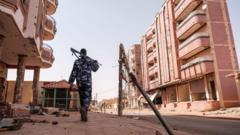With the Assad family's long-standing rule in Syria coming to an abrupt end, their fate hangs in the balance as they navigate offers of asylum and potential legal repercussions in the wake of their regime's past actions.**
Uncertain Future for the Assad Family After Sudden Fall from Power**

Uncertain Future for the Assad Family After Sudden Fall from Power**
The recent ousting of Bashar al-Assad has left his family in a precarious position as they seek refuge in Russia amid rising tensions and potential consequences.**
In a dramatic turn of events, Bashar al-Assad, former president of Syria, was ousted from power on Sunday, signaling the end of a 24-year presidency and over five decades of his family’s rule. The political landscape has shifted following the rise of a transitional government formed by rebels from the Islamist militant group Hayat Tahrir al-Sham (HTS). Currently in Russia, the fate of Assad, his wife Asma, and their three children remains uncertain.
Russia, previously a staunch ally of Assad during the Syrian civil war, offered the Assad family asylum following their loss of control in Damascus. Reports indicate that Russian officials are in discussions with Syrian opposition forces to secure Moscow's interests within the country, although the Kremlin has remained tight-lipped about the specifics of the asylum process.
Assad's ties to Russia are deep-rooted. A 2019 investigation highlighted that his family had invested in luxury real estate in Moscow and traced their wealth, estimated between $1 billion and $2 billion, through various offshore accounts and companies. The family's financial dealings were often intertwined with severe allegations of human rights abuses committed throughout the civil war.
Asma al-Assad, a dual British-Syrian national, has ties to the UK but is currently in Moscow, where her family supports her during this tumultuous time. Analysts note that she may be hesitant to return to the UK, given the U.S. sanctions on her father. Meanwhile, their eldest son, Hafez, continues his studies in Moscow, adding to the family's established presence there.
The potential for prosecution looms large over Assad and his close associates, as calls for accountability for alleged war crimes gain momentum. The Islamist rebel leader recently stated intentions to name senior officials involved in serious human rights violations, including the infamous chemical attacks that have drawn international condemnation. Furthermore, France has initiated proceedings for an arrest warrant against Assad concerning complicity in these crimes, although extradition remains unlikely as long as the family resides in Russia.
With the Assad regime’s collapse marking a pivotal moment for Syria, the future of the family remains precarious, nestled amidst diplomatic negotiations and the potential for legal action over their past rule. The coming weeks will likely reveal the unfolding chapters of their story amid a changing political climate in the region.
Russia, previously a staunch ally of Assad during the Syrian civil war, offered the Assad family asylum following their loss of control in Damascus. Reports indicate that Russian officials are in discussions with Syrian opposition forces to secure Moscow's interests within the country, although the Kremlin has remained tight-lipped about the specifics of the asylum process.
Assad's ties to Russia are deep-rooted. A 2019 investigation highlighted that his family had invested in luxury real estate in Moscow and traced their wealth, estimated between $1 billion and $2 billion, through various offshore accounts and companies. The family's financial dealings were often intertwined with severe allegations of human rights abuses committed throughout the civil war.
Asma al-Assad, a dual British-Syrian national, has ties to the UK but is currently in Moscow, where her family supports her during this tumultuous time. Analysts note that she may be hesitant to return to the UK, given the U.S. sanctions on her father. Meanwhile, their eldest son, Hafez, continues his studies in Moscow, adding to the family's established presence there.
The potential for prosecution looms large over Assad and his close associates, as calls for accountability for alleged war crimes gain momentum. The Islamist rebel leader recently stated intentions to name senior officials involved in serious human rights violations, including the infamous chemical attacks that have drawn international condemnation. Furthermore, France has initiated proceedings for an arrest warrant against Assad concerning complicity in these crimes, although extradition remains unlikely as long as the family resides in Russia.
With the Assad regime’s collapse marking a pivotal moment for Syria, the future of the family remains precarious, nestled amidst diplomatic negotiations and the potential for legal action over their past rule. The coming weeks will likely reveal the unfolding chapters of their story amid a changing political climate in the region.


















